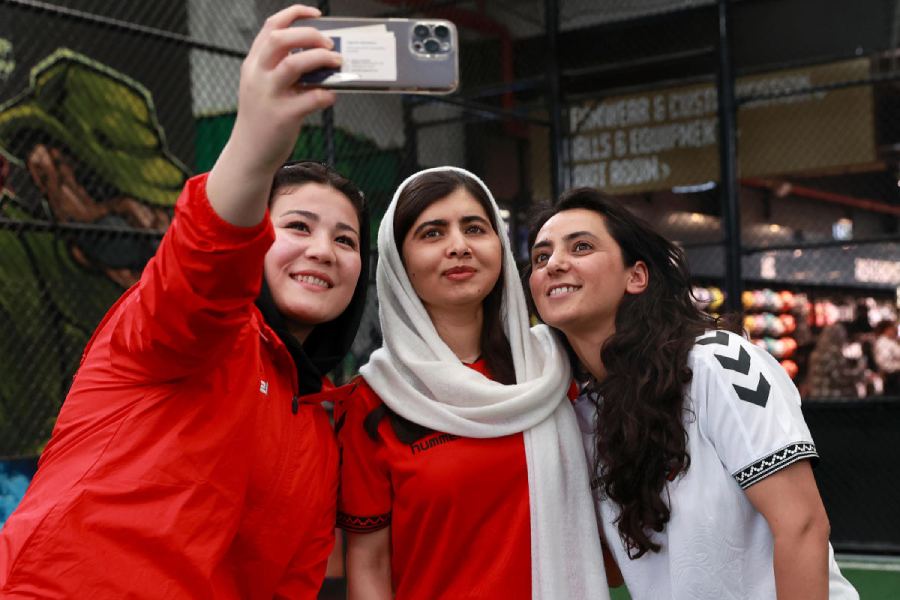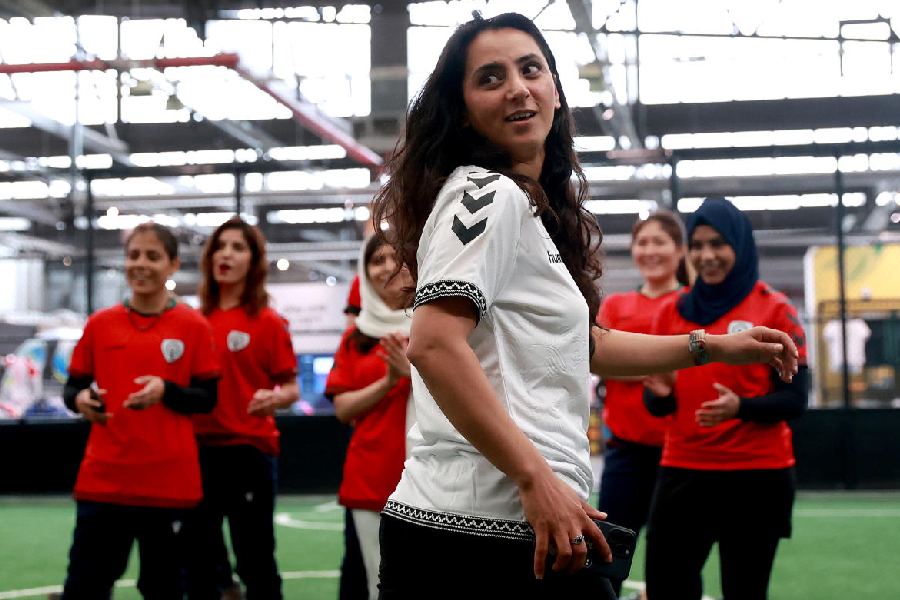Khalida Popal, the former captain of the Afghanistan women’s national football team, woke up on the floor of her apartment near Copenhagen, Denmark, drenched in sweat and shaking.
She had collapsed and couldn’t speak. An ambulance rushed to her.
It was two years ago last month, and the Taliban were taking control of Afghanistan. Female football players on the national team that Popal helped create in 2007 were desperate to leave the country, fearing that the Taliban would kill them for playing the sport.
Players were deluging Popal with requests for help, and she felt smothered by guilt. For more than 15 years, much of that period spent in exile, she had encouraged Afghan girls to participate in all areas of society, including sports, jobs and education.
The message was everything the Taliban despised.
“I feel responsible for these girls,” Popal said later. “I’d rather die than turn my back on them.”
So on that afternoon in 2021, Popal had a panic attack and thought she might be dying. But in a show of her resilience, she waved away the medical workers and returned to her desk to continue coordinating an evacuation of players and their families from Kabul.
Relying on a network she built through her activism, she helped rescue 87 people, including the senior national team. Months later, an additional 130.
Now Popal is on another mission, one that reached its height at this summer’s Women’s World Cup. She is trying to persuade Fifa, football’s global governing body, to let players on the Afghan women’s national team represent their country again after the Taliban barred girls and women from playing sports.
The players, after escaping Afghanistan with Popal’s help, are living in Australia, which hosted this year’s World Cup with New Zealand. Although the team is competing for the Melbourne Victory football club, Fifa refuses to recognise it as a national team because the Afghanistan Football Federation claims it does not exist. Under the Taliban, no women’s team does.
“These players dreamed of playing football for Afghanistan, and men just came and took that dream from them,” Popal said. “Fifa is saying, ‘We are sorry that you’ve lost your right to play football, girls, when you have done nothing to deserve it.’ It’s disgusting.”
In an emailed statement, Fifa said it cannot recognise a national team unless it is first acknowledged by its national federation.
A spokesperson for the Afghanistan Football Federation said the organisation could do nothing to help because the women’s national team dissolved when the players fled the country — an assertion the players reject.
Popal, 36, has been sharing the Afghan team’s story with everyone she can. While working for Right to Dream, a football nonprofit, and Girl Power, her own nonprofit, she organised a petition, which has been signed by more than 175,000 people since published online in late July.
More than 100 politicians endorsed a letter she wrote to Fifa with Julie Elliott, a member of Britain’s Parliament, and Malala Yousafzai, the Nobel Peace Prize winner who was shot in the head by the Taliban when she was 15.

Nobel Peace Prize winner Malala Yousafzai (centre) with Fatima (left), caption of the Melbourne Victory Afghan Women's Team, and Khalida Popal in Melbourne. Getty Images
“Khalida is reminding the world that we are still here, don’t forget us,” said Fati Yousufi, the Afghan team’s captain and goalkeeper. “I know a lot of us have said, ‘I want to be like Khalida one day, a strong and powerful woman.’ ”
Anyone who wants to be like Popal should understand that her advocacy for the Afghan team has come with serious sacrifices.
“It has taken a huge toll on her,” said Kelly Lindsey, an American whom Popal recruited to coach the Afghan national team in 2016. “But she won’t stop for a moment to take care of herself.”
During the Taliban’s first reign, from when Popal was age 9 to 14, she was stuck in a Pakistani refugee tent city, with football as her only outlet. When her family returned to Kabul in 2002 after a US-led coalition drove out the Taliban, she was eager to grow the sport.
Her mother, Shokria Popal, helped recruit players, often contending with parents who called her a prostitute trying to destroy the culture. From the Popals’ efforts, high school teams were born. Five years later, the Afghanistan Football Federation accepted Khalida’s team as the women’s national team.
The team first made national news in 2010 when it played Nato soldiers in Kabul. Speaking to journalists, Popal denounced the Taliban. There was an immediate cost.
Some of her teammates were forced to quit because their families hadn’t known that they were playing. Popal recalled receiving death threats, including from one caller who said he would cut her to pieces.
In 2011, Popal was working as the head of finance and women’s football at the otherwise all-male federation when she complained on national television that the women’s team wasn’t getting enough support. She blamed corrupt sports officials for it.
Days later, she said, a truck rammed into the car she was riding in. Uniformed men fired shots through the windows, but she was not physically harmed. Then, when the Afghanistan Olympic Committee’s headquarters were vandalized, Popal was among those blamed.
Although she denied involvement, police issued a warrant for her arrest. Hours before the government barred her from travelling, she boarded a plane to India.
Popal was on the run. Multiple times she changed her phone number and her hotel, but threats found their way to her.
She made her way to Denmark after sportswear company Hummel, the Afghan team’s sponsor, helped her apply for asylum there.
In exile, Popal eventually volunteered as the Afghan national team’s programme director, organising tournament appearances and hiring coaches.
But even women who remained with the team were not safe. In 2018, Popal saw federation officials sexually harassing players at a training camp in Jordan. Players told her that they had been sexually abused by those and other officials, including
Keramuddin Keram, who was the federation’s president and a powerful politician. Popal reported what she had heard, but for eight months Fifa officials did nothing, according to Popal and Lindsey.
Popal persuaded 10 players to come forward and obtained blueprints of the federation’s headquarters. That paperwork showed Keram had a secret bedroom attached to his office where, players told her, he beat and raped them.
Fifa eventually barred Keram from the sport for life, and the Afghan courts punished him and four others.
News of the case reached other national team players, including those in Haiti, Argentina, Canada and Venezuela. They felt emboldened to speak up about sexual abuse committed by men in their sport, said Jonas Baer-Hoffmann, the general secretary of FIFPRO, the union for professional football players that helped Popal with the abuse case.
“Khalida started a big wave,” he said. “She’s changing the world.”
The Women’s World Cup was ending in a day and Popal was eking out all the publicity she could get for the Afghan team before the world stopped watching.
Yousafzai, the Pakistani activist, helped with that.
After reading in The New York Times about Fati Yousufi and the Afghan team, she wanted to meet the players and help Popal in her efforts.
On a tiny indoor field, with about a dozen television cameras present, Popal listened as Yousafzai and Yousufi gave speeches. She took deep breaths and stared at the ground to fight back tears.
Yousafzai said Fifa needed to change its regulations to let the team compete because playing a sport is a basic human right.
“It is time for people to decide that they are not standing on the Taliban’s side,” she said.
Yousufi was next.
“We are asking them to open the door, open the door for our team, open the door for Afghanistan women,” she said, referring to Fifa. “We don’t want to lose this opportunity.”
Popal never thought she would work alongside someone with Yousafzai’s stature, or that players, like Yousufi, would become forceful leaders worldwide.
“It’s so lonely and tiring to do this on your own, which was what I did for a long time, but now I see that the new generation gets it,” she said, choking up. “It’s not all on my shoulders anymore.”
Safiullah Padshah contributed reporting from Kabul, Afghanistan.
New York Times News Service











